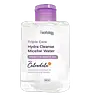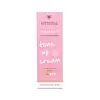What's inside
What's inside
 Key Ingredients
Key Ingredients

 Benefits
Benefits

 Concerns
Concerns

 Ingredients Side-by-side
Ingredients Side-by-side

Water
Skin ConditioningButylene Glycol
HumectantDisodium Cocoamphodiacetate
CleansingBetaine
HumectantSodium Chloride
MaskingSodium Glycolate
BufferingDMDM Hydantoin
PreservativeAllantoin
Skin ConditioningTetrasodium EDTA
Citric Acid
BufferingGlycerin
HumectantCalendula Officinalis Flower Extract
MaskingPropylene Glycol
HumectantPanthenol
Skin Conditioning1,2-Hexanediol
Skin ConditioningPentylene Glycol
Skin ConditioningSodium Benzoate
MaskingPotassium Sorbate
PreservativeSodium Acetylated Hyaluronate
HumectantSodium Hyaluronate
HumectantSodium Hyaluronate Crosspolymer
HumectantPyridoxine
Skin ConditioningThiamine Hcl
MaskingHydrolyzed Sodium Hyaluronate
Skin ConditioningEthylhexylglycerin
Skin ConditioningAscorbic Acid
AntioxidantBioflavonoids
Skin ConditioningBiotin
AntiseborrhoeicCyanocobalamin
Skin ConditioningFolic Acid
Skin ConditioningGlutathione
Menadione
MaskingRiboflavin
Cosmetic ColorantTocopheryl Acetate
AntioxidantWater, Butylene Glycol, Disodium Cocoamphodiacetate, Betaine, Sodium Chloride, Sodium Glycolate, DMDM Hydantoin, Allantoin, Tetrasodium EDTA, Citric Acid, Glycerin, Calendula Officinalis Flower Extract, Propylene Glycol, Panthenol, 1,2-Hexanediol, Pentylene Glycol, Sodium Benzoate, Potassium Sorbate, Sodium Acetylated Hyaluronate, Sodium Hyaluronate, Sodium Hyaluronate Crosspolymer, Pyridoxine, Thiamine Hcl, Hydrolyzed Sodium Hyaluronate, Ethylhexylglycerin, Ascorbic Acid, Bioflavonoids, Biotin, Cyanocobalamin, Folic Acid, Glutathione, Menadione, Riboflavin, Tocopheryl Acetate
Water
Skin ConditioningTitanium Dioxide
Cosmetic ColorantEthylhexyl Methoxycinnamate
UV AbsorberNiacinamide
SmoothingPolymethyl Methacrylate
Propylene Glycol
HumectantDimethicone
EmollientStearic Acid
CleansingGlyceryl Stearate
EmollientPhenoxyethanol
Preservative4-Methylbenzylidene Camphor
UV AbsorberPolyacrylamide
Cetyl Alcohol
EmollientCyclopentasiloxane
EmollientPolymethylsilsesquioxane
PEG-100 Stearate
C13-14 Isoparaffin
EmollientButyl Methoxydibenzoylmethane
UV AbsorberAllantoin
Skin ConditioningPanthenol
Skin ConditioningTocopheryl Acetate
AntioxidantLaureth-7
EmulsifyingDisodium EDTA
Ethylhexylglycerin
Skin ConditioningButylene Glycol
HumectantTriethoxycaprylylsilane
Aluminum Hydroxide
EmollientDimethicone/Vinyl Dimethicone Crosspolymer
Skin ConditioningParfum
MaskingActinidia Polygama Fruit Extract
Skin ConditioningArbutin
AntioxidantCitric Acid
BufferingSodium Sulfite
PreservativeAcetyl Tyrosine
Skin ConditioningSaxifraga Sarmentosa Extract
Skin ConditioningPaeonia Suffruticosa Root Extract
Skin ProtectingAminopropyl Ascorbyl Phosphate
AntioxidantScutellaria Baicalensis Root Extract
AstringentGlutathione
PEG-40 Castor Oil
EmulsifyingTriethanolamine
BufferingHexylene Glycol
EmulsifyingAmmonium Acrylates Copolymer
CI 12490
Cosmetic ColorantWater, Titanium Dioxide, Ethylhexyl Methoxycinnamate, Niacinamide, Polymethyl Methacrylate, Propylene Glycol, Dimethicone, Stearic Acid, Glyceryl Stearate, Phenoxyethanol, 4-Methylbenzylidene Camphor, Polyacrylamide, Cetyl Alcohol, Cyclopentasiloxane, Polymethylsilsesquioxane, PEG-100 Stearate, C13-14 Isoparaffin, Butyl Methoxydibenzoylmethane, Allantoin, Panthenol, Tocopheryl Acetate, Laureth-7, Disodium EDTA, Ethylhexylglycerin, Butylene Glycol, Triethoxycaprylylsilane, Aluminum Hydroxide, Dimethicone/Vinyl Dimethicone Crosspolymer, Parfum, Actinidia Polygama Fruit Extract, Arbutin, Citric Acid, Sodium Sulfite, Acetyl Tyrosine, Saxifraga Sarmentosa Extract, Paeonia Suffruticosa Root Extract, Aminopropyl Ascorbyl Phosphate, Scutellaria Baicalensis Root Extract, Glutathione, PEG-40 Castor Oil, Triethanolamine, Hexylene Glycol, Ammonium Acrylates Copolymer, CI 12490
 Reviews
Reviews

Ingredients Explained
These ingredients are found in both products.
Ingredients higher up in an ingredient list are typically present in a larger amount.
Allantoin is a soothing ingredient known for its protective and moisturizingg properties. Because of this, it is often added to products with strong active ingredients.
Studies show higher concentrations of this ingredient can promote wound healing.
Though it can be derived from the comfrey plant, allantoin is produced synthetically for cosmetic products to ensure purity.
Learn more about AllantoinButylene Glycol (or BG) is used within cosmetic products for a few different reasons:
Overall, Butylene Glycol is a safe and well-rounded ingredient that works well with other ingredients.
Though this ingredient works well with most skin types, some people with sensitive skin may experience a reaction such as allergic rashes, closed comedones, or itchiness.
Learn more about Butylene GlycolCitric Acid is an alpha hydroxy acid (AHA) naturally found in citrus fruits like oranges, lemons, and limes.
Like other AHAs, citric acid can exfoliate skin by breaking down the bonds that hold dead skin cells together. This helps reveal smoother and brighter skin underneath.
However, this exfoliating effect only happens at high concentrations (20%) which can be hard to find in cosmetic products.
Due to this, citric acid is usually included in small amounts as a pH adjuster. This helps keep products slightly more acidic and compatible with skin's natural pH.
In skincare formulas, citric acid can:
While it can provide some skin benefits, research shows lactic acid and glycolic acid are generally more effective and less irritating exfoliants.
Most citric acid used in skincare today is made by fermenting sugars (usually from molasses). This synthetic version is identical to the natural citrus form but easier to stabilize and use in formulations.
Read more about some other popular AHA's here:
Learn more about Citric AcidEthylhexylglycerin (we can't pronounce this either) is commonly used as a preservative and skin softener. It is derived from glyceryl.
You might see Ethylhexylglycerin often paired with other preservatives such as phenoxyethanol. Ethylhexylglycerin has been found to increase the effectiveness of these other preservatives.
Glutathione is an antioxidant naturally found in our bodies. It is made up of three amino acids: glycine, cysteine, and glutamic acid.
As an antioxidant, it prevents oxidative damage to parts of our cell.
While glutathione is said to help with fading dark spots, the results from research are inconclusive. Further studies are needed. With that said, gluthatione has been shown to protect our skin from UV-B induced damage.
This ingredient is naturally occurring in plants, animals, fungi, and some bacteria.
Learn more about GlutathionePanthenol is a common ingredient that helps hydrate and soothe the skin. It is found naturally in our skin and hair.
There are two forms of panthenol: D and L.
D-panthenol is also known as dexpanthenol. Most cosmetics use dexpanthenol or a mixture of D and L-panthenol.
Panthenol is famous due to its ability to go deeper into the skin's layers. Using this ingredient has numerous pros (and no cons):
Like hyaluronic acid, panthenol is a humectant. Humectants are able to bind and hold large amounts of water to keep skin hydrated.
This ingredient works well for wound healing. It works by increasing tissue in the wound and helps close open wounds.
Once oxidized, panthenol converts to pantothenic acid. Panthothenic acid is found in all living cells.
This ingredient is also referred to as pro-vitamin B5.
Learn more about PanthenolPropylene Glycol is an odorless, colorless liquid. As a humectant, it helps skin retain moisture. It also aids in delivering active ingredients.
Another role of this ingredient is preventing a product from melting or freezing. Propylene glycol also adds antimicrobrial properties to a product, elongating product lifespan.
This ingredient is considered an organic alcohol and commonly added into both cosmetics and foods.
Those with sensitive skin or conditions may develop a rash when using this ingredient.
Learn more about Propylene GlycolTocopheryl Acetate is AKA Vitamin E. It is an antioxidant and protects your skin from free radicals. Free radicals damage the skin by breaking down collagen.
One study found using Tocopheryl Acetate with Vitamin C decreased the number of sunburned cells.
Tocopheryl Acetate is commonly found in both skincare and dietary supplements.
Learn more about Tocopheryl AcetateWater. It's the most common cosmetic ingredient of all. You'll usually see it at the top of ingredient lists, meaning that it makes up the largest part of the product.
So why is it so popular? Water most often acts as a solvent - this means that it helps dissolve other ingredients into the formulation.
You'll also recognize water as that liquid we all need to stay alive. If you see this, drink a glass of water. Stay hydrated!
Learn more about Water